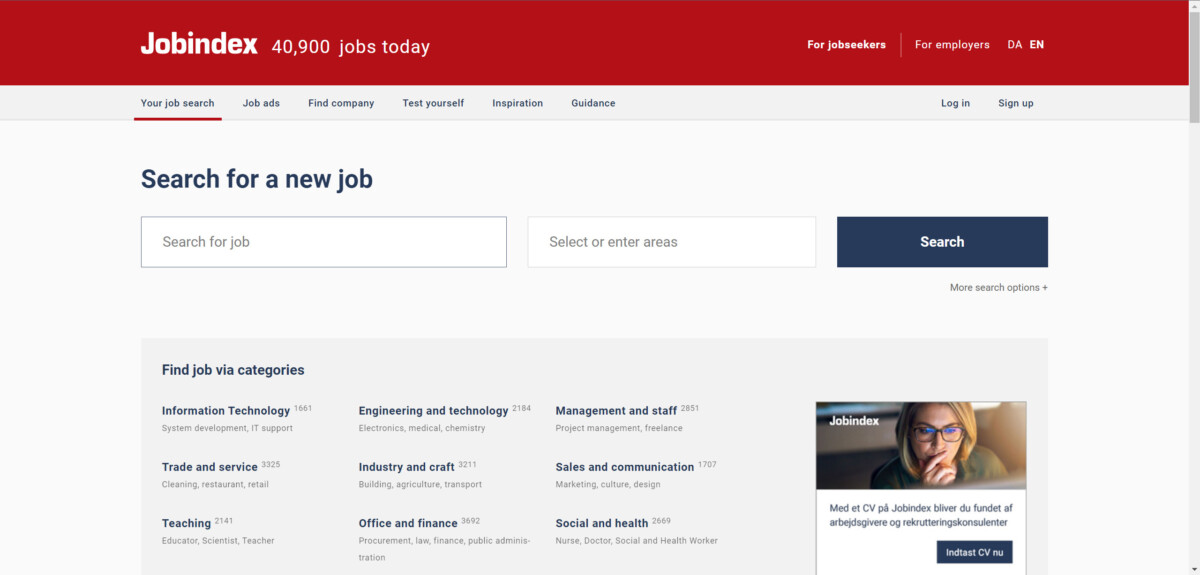Danish job board Jobindex is suing Google for anticompetitive practices with European Union regulators. The American giant would have promoted its own job search service on its search engine.
This is far from the first time that Google (which belongs to the Alphabet group) has faced a complaint filed for anti-competitive practices, even with the European Union. This time, the entity filing suit is Jobindex, a Danish job search portal, against Google for Jobs, Google’s job search service. The latter would have favored his service over others in his search results, to the detriment of the competition.
What is Google for Jobs?
This service offered by Google is actually a job aggregator launched in May 2017. More than a new search engine tab, Google sees it as an artificial intelligence tool to find the right job. It includes ads posted on LinkedIn, Monster, Facebook, Glassdoor, etc. The tab offers search filters based on industry, post date, salary bracket, and more. Note that this tool then refers to the sites on which the ads are published.
Reuters, who broke the news, said Google for Jobs was launched in 2018, and the following year 23 competitors filed reviews against the tool. They claimed to have lost market share as a result of the launch, ” after the online search giant allegedly used its market power to push its new service “. Critics of questionable practices go back a few years.
What Jobindex criticizes Google for
On June 27, we learned in Brussels of a complaint filed by Jobindex against Google for anti-competitive practices.Reuters writes that Jobindex “said Google had distorted to its advantage, by anti-competitive means, what was a highly competitive Danish market “. Kaare Danielse, its CEO and founder, said Jobindex was the largest job vacancy database in Denmark until then when Google for Jobs entered the Danish market.
He added that “in the short time after the introduction of Google for Jobs in Denmark, Jobindex lost 20% of search traffic to Google’s inferior service“. He pursues : “by placing its own substandard service at the top of search results pages, Google is effectively hiding some of the most relevant job postings from job seekers. Recruiters, in turn, can no longer reach all job seekers unless they use Google’s job service“. Kaare Danielse explains that in addition to stifling competition between these services, it would “directly affect labor markets, which are at the heart of any economy“.

The main problem with Google for Jobs according to Jobindex is that the tool is displayed first in Google’s search results. This favors it and relegates other aggregators and offer platforms below. Internet users are then encouraged to use Google for Jobs and not its competitors.
In addition to all that, Jobindex accuses Google of having copied certain job offers without its authorization. The site also raises the issue of risks related to the protection of the data of candidates and client companies.
Jobindex is asking the European Commission to put an end to what it considers to be anti-competitive practices, to impose a fine on Google and to impose periodic payments to ensure compliance with the rules.
What are the consequences for this complaint against Google?
Google says “partner with job providers to direct people to websites with job postings relevant to them“. A spokesperson for the giant says that “any job provider, big or small, is able to participate and companies are seeing increased traffic and job matches with this feature“. By saying this, Google completely refutes Jobindex’s position.
Reutersnotes that this may attract interest from other job ad platforms. This is what happened with the price comparators, who had succeeded in having Google sanctioned with a heavy fine, with a complaint filed by Foundem initially. The giant had been sentenced to pay a fine of 2.42 billion euros for favoring its price comparator. A legal story that continues with PriceRunner, a Swedish price comparator suing Google and claiming around 2.1 billion euros.
As the news agency points out, Margrethe Vestager, European Commissioner for Competition, “said she was looking into the matter(from Google for Jobs)but she hasn’t taken any action yet“. It must be said that the sanctions pronounced by the Commission can be contradicted by the Court of Justice. This is what happened a few days earlier for Qualcomm, which escaped a fine of nearly one billion euros. Rushing could undermine the authority of the Commission in the affairs ofantitrust.
The Commission has so far stated that it “assess the complaint in accordance with standard procedures“. In just a few years, it has fined Google more than 8 billion euros for its anti-competitive practices.
To follow us, we invite you to download our Android and iOS application. You can read our articles, files, and watch our latest YouTube videos.
